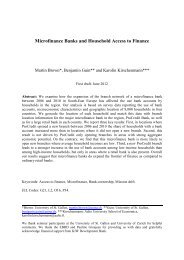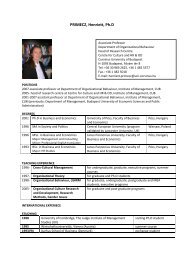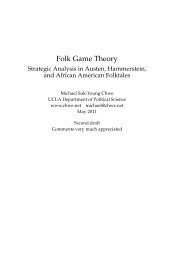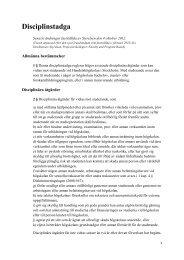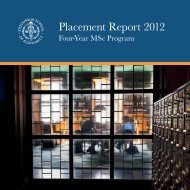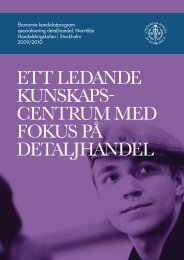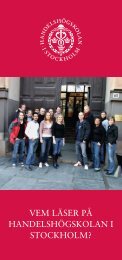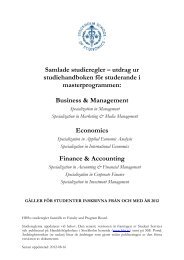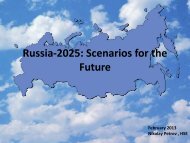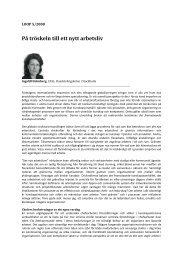A Proposal for a Way Forward-2012.indd - Konrad-Adenauer-Stiftung
A Proposal for a Way Forward-2012.indd - Konrad-Adenauer-Stiftung
A Proposal for a Way Forward-2012.indd - Konrad-Adenauer-Stiftung
Create successful ePaper yourself
Turn your PDF publications into a flip-book with our unique Google optimized e-Paper software.
A <strong>Proposal</strong> <strong>for</strong> a <strong>Way</strong> <strong>Forward</strong>on EU-Japan Cooperation atthe Nexus of Security andDevelopmentResults of the KAS-EJARN Project at the Nexus ofSecurity and Development in 2011/2012
Table of ContentsChapterPageForeword 3Statement by Elmar Brok 6Statement by Misako Yasui 9Policy Recommendations <strong>for</strong> EU-Japan Political and Security 12Cooperation at the Nexus of Security and DevelopmentSummary of the Workshop in Berlin 19Summary of the Conference in Tokyo 28Participants of the Project 36Annex 48
KAS is a political foundation with the mission of fostering anddeveloping cooperation and research with partners all over the world.The foundation participates in shaping policies in developing andemerging countries together with like-minded partners. Trans<strong>for</strong>mationprocesses, conflict prevention, human security and civil societies areessential elements of concern. There<strong>for</strong>e Japan is considered by KAS tobe an important actor in this developmental area <strong>for</strong> Europe.Since the end of the Cold War EU-Japan relations have been governedby two main documents that were proclaimed at ten-year intervals,namely the 1991 Hague Declaration and so-called ten-year “Actionplan” (2001-11). The Action plan set very ambitious goals in over 100areas pinpointed <strong>for</strong> cooperation, yet in the end produced very littleconcrete action. At the EU-Japan summit in May 2011 the decision wastaken not to draft a new 10 year plan, but instead to aim <strong>for</strong> a deep andcomprehensive free trade/economic partnership agreement, and at thesame time start negotiations <strong>for</strong> a binding agreement covering security,political, global and other sectoral cooperation.To give input to this process EJARN and KAS, together with severalJapanese partners, jointly initiated a project <strong>for</strong> generating ideasto further Europe-Japan cooperation in the nexus of security anddevelopment. Over the last year we held three conferences with variouspartners in Europe and Japan. Our first meeting, held in Berlin inSeptember 2011, set the goals and parameters of the project. We helda second conference co-organized with Japan International CooperationAgency (JICA) in Tokyo in February 2012. We gratefully acknowledge theinterest and support of JICA, in particular of its then President, MadameSadako Ogata. At a final meeting in Brussels in May 2012, we presenteddraft policy recommendations.What you are now holding in your hands are the policy recommendations(incorporating comments and suggestions from our Brussels meeting)<strong>for</strong> deepening EU-Japan cooperation. To provide background <strong>for</strong> theserecommendations, we have also included summaries of some of thepapers presented at these conferences. The full papers will be madeavailable online.4
We hope that these recommendations will be helpful in moving the EU-Japan relationship <strong>for</strong>ward.Professor Marie SöderbergChairperson of EJARNEuropean Institute of Japanese StudiesJörg WolffResident Representative <strong>for</strong> Japan andRegional Representative <strong>for</strong> Economic Policy<strong>Konrad</strong> <strong>Adenauer</strong> FoundationVisit EJARN athttp://www.hhs.se/EIJS/EJARN/Pages/EJARN.aspxVisit KAS Japan athttp://www.kas.de/japan/5
Statement by Elmar BrokMember of the European ParliamentGroup of the European People's Party (EPP)Chair, Committee on Foreign AffairsThe future of EU-Japan cooperation beyond security anddevelopmentThe European Union and Japan are divided by thousands of kilometres,yet our interests and values are not so far apart. Both are global actors,particularly cooperating in the economic arena, but increasingly also inpolitical terms. There is a strong mutual interest to actively pursue apolicy of world peace, stability and security, of freedom, democracy, therule of law and the defence of Human Rights, and of course to continuethe development of multilateralism and the primacy of the free marketeconomy.Our common commitment to those values is stated in the JointDeclaration and of 1991 and the Action Plan <strong>for</strong> EU-Japan Cooperationof 2001, which are basis <strong>for</strong> the establishment of shared principlesand objectives. A political impetus is given to this relationship by theannual EU-Japan summit taking place at the level of the President of theEuropean Commission and the Japanese Prime Minister.The overall basis <strong>for</strong> the partnership is a deep economic interdependencebetween Japan and Europe - two economies which together account 40per cent of the world's GDP, 30 per cent of world trade and provide halfof the world's outflow of <strong>for</strong>eign direct investment. A strong Japaneseeconomy is in the interest of all its partners including the EU - after all,Japan is the EU's fifth-largest trading partner overall, with a total twowaytrade of 118,14 billion Euro in 2011 and an export sales volume of20 per cent coming from the EU.The EU is concerned due to the amount of potential conflicts and6
security issues in front of the doorstep of Japan. The most recentconflict in the Asian-pacific area is the escalating dispute about Japan'ssovereignty over several pacific islands in the south-china sea whichare controlled by Japan but claimed by China and Taiwan. The rowcomes at a time when both China and Japan are facing political changesdomestically - while China faces major changes in the top echelonsof leadership, Japanese Prime Minister Yoshihiko Noda's governmentis likely to hold an election in coming months. These circumstancesmake it difficult <strong>for</strong> either side to be seen as backing down, increasinglyleading to violent anti-Japanese protests in several Chinese cities. Therealso remain uncertainties, <strong>for</strong> instance, concerning the new leadershipin North Korea around Kim Jong Un and its less transparent militarystrategies. Another long lasting worrying issue is the Indian-Chineseconflict over their common border.These ongoing tensions make clear that conflict prevention is an issuewhere cooperation becomes more and more important. It is a good sign,<strong>for</strong> instance, that Japan has given assistance in the Iraq conflict by thedeployment of Self-Defence Forces, which showed Japan's increasingwill to accept its responsibility in the world. And also as the EuropeanUnion is further strengthening its common <strong>for</strong>eign- and securitypolicy, especially through the newly-established European ExternalAction Service (EEAS), it puts great emphasis on the monitoring of theworldwide political situation in order to react quickly and effectively topossible threats to security.Europe and Japan must deepen their political cooperation to a levelthat is adequate to their economic cooperation. Both are in a processof growing economic interdependence, which is currently made visibleby the planned Free Trade Agreement between the EU and Japan. Thisleads to the fact that often events in the one region shape developmentsand have an impact on the other, resulting in a common interest by theEU and Japan to play an active role in maintaining economic and politicalstability in the everyday changing global world order.Japan will be - together with the European Union, China and the USA -a main actor in the 21st century: As an economic competitor, but also7
as an indispensable partner in finding solutions <strong>for</strong> global questions. Itis the EU's interest <strong>for</strong> Japan to be a factor of political stability in theAsia-Pacific region and the world, to support the multilateral free tradesystem, to encourage democracy and greater respect <strong>for</strong> Human Rights.Whenever I talk about Europe, I say that the member states have tounderstand that they cannot cope with today's challenges on their own.This is also applicable <strong>for</strong> the EU-Japan relationship and the economicand political global challenges that we share.8
Statement by Misako YasuiMember of the House of Councillors, JapanDemocratic Party of Japan (DPJ)Vice Director-General, International Department, DPJDirector, Committee on Economy and IndustryMember, Special Committee on Official DevelopmentAssistance and Related MattersJapan and the European Union (EU) share fundamental values suchas democracy, constitutional government, and human rights, and arepartners in cooperative ef<strong>for</strong>ts in pursuit of the peace and prosperity ofthe international community. “Human security” has been the keyword inthis cooperation. In order to address the political, economic, and otherissues they face, multi-tiered dialogue is essential.In the spheres of national security and development assistance inparticular, there is huge scope <strong>for</strong> future cooperation. Of particularconcern is that if regions where the situation is fragile during or inthe aftermath of conflict are neglected, those conflicts may becomeglobalized and pose a direct threat to Japan and the EU. In view of this,these regions are the major priority in Japan-EU security cooperation.In post-conflict regions such as in Africa and Asia, Japan and the EU cancontribute to the international community by assisting reconstructionand capacity building which involves collaboration between Japan’s Self-Defense Forces and EU relief organizations. The people of Japan shouldunderstand that this will, in turn, lead to peace and security <strong>for</strong> Japan.The anti-piracy measures in the waters off the coast of Somalia havealready demonstrated the effectiveness of Japan-EU cooperation in thearea of security, and they are expected to be broadened to encompassactivities at the Regional Training Centre in Djibouti and in<strong>for</strong>mationsharingcenters in countries such as Yemen, Kenya, and Tanzania. Withregard to Japan-EU cooperation in the area of development assistance,9
schemes and financial support provided by the Japan InternationalCooperation Agency (JICA) in Tanzania, Malawi, and Zambia are provedto be successful and are expected to bear further fruits in the future.Japan and the EU have capabilities and experience that are mutuallycomplementary. For example, the Japanese Self-Defense Forces’water-purification technology has been tested and proven. By takingadvantage of their experience during the Great East Japan Earthquake,joint exercises should be conducted on a regular basis <strong>for</strong> disastermanagement.In order to strengthen the relationship between Japan and the EU stillfurther, the conclusion of a political agreement should be expedited.Doing that is also a prerequisite <strong>for</strong> starting negotiations <strong>for</strong> a Japan-EU economic partnership agreement (EPA). At the regular Japan-EUsummit meeting in 2011, it was agreed to explore the possibility ofnegotiations toward the conclusion of an EPA and political agreement.A Japan-EU EPA would not only have economic significance, but in viewof its great scale it may also contribute to fiscal rehabilitation and socialstabilization on both sides. The negotiations should, there<strong>for</strong>e, begin assoon as possible. In October the European Parliament voted to supportthe opening of negotiations with Japan on an EPA. We expect that theEuropean Commission will respect that decision and enter into concreteand constructive negotiations with Japan. In addition, we believe itwill be essential <strong>for</strong> Japan to monitor closely the process leading toeventual ratification of the agreement by the parliaments of EU membercountries and the European Parliament.Although differences of opinion and values may arise with regard to theplaces where assistance is provided, the permanent presence of a JICAofficial in Brussels since July 2012 is likely to ensure closer exchangesof in<strong>for</strong>mation between Japan and the EU. Personal interchange of thiskind is most welcome.It is regrettable that there have been few opportunities in the JapaneseNational Diet to give in-depth attention to the subject of collaborationwith other countries in the areas of national security and developmentassistance. Through the discussions at the “Nexus of Security10
and Development: Opportunities and Prospects <strong>for</strong> Europe-JapanCooperation” at this meeting we have deepened our understandingof the importance of the relationship between Japan and the EU. Wehope that this not only stimulates discussion within Japan, but alsoplays the role of achieving multi-tiered strengthening of the Japan-EUrelationship, including in the areas of national security and developmentassistance.11
Policy Recommendations <strong>for</strong> EU-JapanPolitical and Security Cooperationat the Nexus of Security and Development• The envisioned EU-Japan binding agreement, intended tocover global political, security, development and other sectoralcooperation might be broad in scope, but it should limit its focusto a small number of issues that the EU and Japan can realisticallyaddress by pooling their limited resources.• EU-Japan security cooperation should focus on conflict andpost-conflict zones and fragile states in developing regions,and be motivated by the understanding that such conflicts, leftunaddressed, can mutate from local conflicts into global threats thatdirectly endanger the security of the EU and Japan. For example,the failure to address the internal conflict in Afghanistan be<strong>for</strong>e2001 contributed to the emergence of a global terrorist threat thathas menaced both the EU and Japan. An unaddressed conflict inSomalia that greatly degraded human security there has similarlymorphed into a threat to the global Sea-Lanes of Communication(SLOCs) that both the EU and Japan depend on <strong>for</strong> energy imports,and as crucial avenues <strong>for</strong> bilateral trade.• EU-Japan security cooperation should focus on non-combatcooperation in post-conflict zones in Africa, Asia, and elsewhere.Civilian, non-combat military operations and soft power securitycooperation are areas where EU-Japan cooperation can make thebiggest contribution. The Lisbon Treaty and the Common Securityand Defence Policy (CSDP) provide opportunities <strong>for</strong> the EU tocreate new patterns of collaboration with Japan. Civilian CSDPmissions should be matched with Japanese ones, especially in Asia,where Japan has great expertise. EU-Japan cooperation should be atthe nexus of security and development, bringing together civilians,aid agencies, and militaries to promote post-conflict reconstruction,12
capacity building and development projects.• Since July 2010, the EU and Japan have discussed the expansionof regular EU-Japan crisis management consultations and apossible Japanese contribution to civilian missions under the EUCommon Security and Defence Policy (CSDP). In 2011, the EU andJapan discussed setting up a so-called ‘Framework ParticipationAgreement’ to institutionalize Japanese civilian contributions to EUCSDP missions. This framework should be set up quickly in orderto enable Japan to make such contributions. Japan’s contributionsto the reconstruction and pacification of the Western Balkans inthe framework of EU missions throughout the 1990s have beensignificant, and the EU should take advantage of Japan’s impressiveexpertise and experience <strong>for</strong> its global CSDP missions.• In the early 2000s, Japan articulated a desire to enhance itsinternational security role through the expansion of non-combatcooperation with the EU, as <strong>for</strong>mulated in the 2001 EU-Japan ActionPlan. Such diversification aims, among other things, to enhanceJapan’s ability to play a global security role by stabilizing postconflictzones, even in cases where cooperation with its US ally isnot well suited to such missions. The envisioned bilateral politicalframework agreement can thus be used by both Brussels and Tokyoto facilitate more substantive Japanese contributions <strong>for</strong> stabilizingpost-conflict zones at the nexus of security and development.• While the EU has much to offer Japan in terms of experienceand specific expertise, Japan also has much it can offer the EU.Japan’s experiences using its military to conduct reconstructionand development projects in southern Iraq and South Sudancan be useful <strong>for</strong> the EU. Similarly, the EU can also benefit fromthe SDF’s outstanding expertise in specific areas, such as waterpurification. Japan’s pioneering experience from a decade ago incounter-piracy capacity building in Southeast Asia, both bilaterallyand multilaterally through establishing the Regional CooperationAgreement on Combating Piracy and Armed Robbery against Shipsin Asia (ReCAAP), an agreement that many European nations are13
now joining, is another experience of value <strong>for</strong> the EU. The EUshould also consider establishing direct ties with ReCAAP.• Promising cases where EU-Japan cooperation in the nexus ofsecurity and development should be applied in the short-run includemilitary and aid agency cooperation in South Sudan, East Timor,Mindanao, and perhaps Afghanistan. The EU and Japan should alsocooperate on building local counter-piracy capacity in East Africaand the Southern Arabian Peninsula, while also addressing theon-land causes of piracy. Moreover, they should work together toencourage the <strong>for</strong>mation of a regional multilateral organization<strong>for</strong> this purpose. While building on the fledgling Djibouti Code ofConduct and training center, and the EU’s Maritime Security CentreHorn of Africa (MSCHOA), this organization should be based broadlyon the model of the ReCAAP treaty and its In<strong>for</strong>mation-SharingCentre in Singapore.• The EU and Japan should also jointly promote human securityby building military-to-military disaster relief cooperation. TheJapanese military, which has had disaster relief as a core missionsince the 1950s, and has gained extensive experience fromdeployments following the 2004 Indian Ocean tsunami and theMarch 2011 earthquake and tsunami in Japan, can offer its EUcounter-parts a wealth of experience. We recommend regularbilateral disaster relief exercises between the military and civiliandisaster relief agencies of the two sides. We also recommend thatthey consider concluding a Status of Forces Agreement (SoFA) tocover temporary disaster-relief military deployments to each other’sterritories.• We recommend that the EU and Japan consider concluding anAcquisition and Cross Servicing Agreement (ASCA), so that SDFand EU military units can supply each other in the course of postconflictreconstruction and Humanitarian and Disaster Relief (HADR)missions. The recent adoption of an ASCA between Japan andAustralia could serve as a model <strong>for</strong> an ASCA between Brussels andJapan.14
• As part of promoting EU-Japan cooperation in the nexus of securityand development, human security should be upgraded to a coreprinciple underpinning this cooperation. This is a concept thatmirrors shared normative values and reflects the reality that bothsides have been the leading promoters of the concept globally.Exploiting the two party’s comparative advantages, their humansecurity perspectives and capabilities should be applied to all workin post-conflict zones.• The EU and Japan should follow through on their calls <strong>for</strong> moreeffective multilateralism with more joint policies. In a globalizedworld the EU and Japan need to cooperate with other nations aswell. This should be done under the UN framework where theytogether could promote common normative values. Given that thegoals of peace-building and human security together embody thenexus of security and development, and that the EU and Japan haveup to now exercised significant leadership <strong>for</strong> both, Brussels andTokyo should explore ways to increase cooperation between thePeace Building Trust Fund and the Trust Fund <strong>for</strong> Human Security.• Both the EU and Japan signed the “New Deal <strong>for</strong> Fragile States” atthe Busan conference in 2011. They should now agree to adhereto this in their implementation of ODA (Official DevelopmentAssistance), and take a step back to let fragile states be in thedriver’s seat of their own development. Both the EU and Japanshould encourage on-the-ground cooperation <strong>for</strong> the “New Deal<strong>for</strong> Fragile States”. The EU has gained valuable experience fromcoordinating its own member’s aid policies, and Japan is animportant aid power whose participation in this coordination wouldenhance the impact and effectiveness of Japanese and EU aid.• The signing of the “New Deal <strong>for</strong> Fragile States” should lead to jointEuropean-Japanese aid and development policies on the ground.While many protocols (such as nuclear disarmament and nonproliferationprotocols) have been jointly signed in the past, jointsignatures and declarations have, to date, rarely resulted in jointpolicies on the ground. This needs to change.15
• Political leaders in both Brussels and Tokyo need to exerciseleadership to overcome numerous bureaucratic and proceduralobstacles that have repeatedly stood in the way of implementingnon-combat security cooperation. A related problem is thatpolitical leaders on both sides do not sufficiently know each otheror understand the potential <strong>for</strong> cooperation. Ef<strong>for</strong>ts must be madeto expand leadership exchanges, especially in relation to securityand development cooperation (e.g. the dialogues proposed below).Academics and other experts can play an important role in thisprocess, and should be consulted when <strong>for</strong>mulating policies andinvolved in political exchanges.• Even if concluding the envisioned EU-Japan economic partnershipagreement/free trade agreement will likely take longer thanadopting the binding agreement covering global political, securityand other sectoral cooperation, the realization of the politicalagreement should move ahead regardless. Given the number ofunresolved issues on the bilateral EU-Japan trade and investmentagenda, the adoption of the envisioned free trade agreement couldstill be years away. That however should not stand in the way of theEU and Japan adopting a new political framework institutionalizingcooperation in international security and development policies inthe years ahead.• A bilateral track-two dialogue, including politicians, uni<strong>for</strong>medmilitary and law en<strong>for</strong>cement personnel, and bureaucratsparticipating in their private capacities, academics, journalists andrepresentatives from NGOs, should be launched to continue theprocess of coming up with new ideas <strong>for</strong> moving EU-Japan politicosecuritycooperation <strong>for</strong>ward, and evaluate on-going cooperation.• Another central task of this track-two dialogue will be to developa joint EU-Japan definition of Basic Human Security. The aim isto come up with a definition that includes both freedom fromwant and freedom from fear, but at a level that is not excessivelycomprehensive or idealized, a core definition that can provide thebasis <strong>for</strong> promoting social and economic development. This dialogue16
should also explore ways in which the EU and Japan can jointlyexert leadership to strengthen the UN’s institutional capacity inpeace-building and human security. It should examine ways bywhich the two sides can increase cooperation between the PeaceBuilding Trust Fund and the Trust Fund <strong>for</strong> Human Security in amore result-oriented way, including the possibility of mergingthese two institutions in order to pool and render the allocation ofresources more efficient and effective.• The publicly available in<strong>for</strong>mation regarding EU-Japan cooperationprovided by the two sides, especially by the EU, is woefullyinadequate. In order to give the interested public and scholars achange to assess the quality, scope and contents of joint policies,the two sides need to provide far more extensive and detailedin<strong>for</strong>mation. Easily accessible and dedicated websites that offerdetailed in<strong>for</strong>mation (including non-classified technical details)regarding past, present, and envisaged cooperation need to bemaintained by both governments.• Considering programs in place between the US and Japan, andJapan and a number of Asian countries, a new program should beestablished between Brussels and Tokyo to enable the short-termexchange of officials and uni<strong>for</strong>med officers among bureaucraciesdealing with aid and defence policies in order to facilitate greaterunderstanding of each other’s policies, perspectives, and operatingprocedures. This exchange should also be open to academicsspecializing in these policy areas.• Once the EU-Japan political agreement is adopted, a bilateral trackonemechanism should be established to review progress in, andpropose new ideas <strong>for</strong>, implementing the new EU-Japan politicalagreement, with reviews taking place every year be<strong>for</strong>e the annualEU-Japan summit meeting. The results of such a review processshould be made publicly available in order to increase transparencyand invite input from scholars and analysts working on EU-Japanrelations, and especially from the Track two dialogue. Diplomats,aid officials and other bureaucrats, uni<strong>for</strong>med military and law17
en<strong>for</strong>cement officers should participate. This review mechanismshould also include input from the track two-dialogue and fromrelevant academics and academic networks from both the EU andJapan.(Authored by Axel Berkofsky, Paul Mid<strong>for</strong>d and Marie Söderberg)18
Summary of the Workshop in BerlinThe Nexus of Security and Development :Opportunities and Prospects <strong>for</strong> Europe-Japan CooperationThis paper is a summary of all papers presented in Berlin in September2011.Kuniko Ashizawa (from Ox<strong>for</strong>d Brookes University) examines Japan’sten-year old stabilization and reconstruction assistance in Afghanistan,focusing her analysis on examining Tokyo’s ef<strong>for</strong>t to cooperate andcollaborate with other international donors, most notably the UnitedStates, but also the EU and its individual member countries, inimplementing their assistance programs. In her paper titled JapaneseAssistance in Afghanistan-A Possible Area <strong>for</strong> EU-Japan Cooperation?Ashizawa argues that while Japan does rarely get mentioned in theinternational coverage on Afghanistan, the country assumes theposition of second rank, after the US, in overall assistance disbursed toAfghanistan between 2002 and 2010.Japanese assistance provided <strong>for</strong> Afghanistan in the context ofstabilization and reconstruction policies amounts to $7.2 billion (includingthe $5 billion pledge made in late 2009). Japanese assistance programsin Afghanistan, Ashizawa explains, have almost exclusively been of nonmilitarynature, with no Japanese military personnel on the ground.This, the author explains, goes in accordance with Tokyo’s emphasis onpeace-building and state-building policies, rather than counter-terrorismpolicies or contributions to the so-called US-led ‘war on terrorism’.Japan’s policy approaches towards Afghanistan, the author explains, arenot identical with those of the EU, the third largest donor in the country:Japan’s reconstruction and development projects are often found inthe areas of traditional, peacetime development programs, such asinfrastructure and agricultural and rural development, while the EU andindividual European countries tend to place emphasis on the areas ofgovernance, human rights, and gender. Afghan policymakers, the author19
explains, typically refer to Japan as an honest and trusted partner<strong>for</strong> the country, thanks largely to its non-involvement in past Afghanconflicts and to its steady, if not substantial, development assistanceduring the pre-Taliban period—and probably also due to the present lackof any Japanese military presence.Marie Söderberg (from the European Institute of Japanese Studiesat Stockholm School of Economics) analyses the state and futureprospects of Japanese ODA payments and policies in her paper titledPromoting Peace Building through EU–Japan Cooperation in ODA. Sheconcludes that-despite recent budget cuts and worsening Japanesepublic finances-the country will remain an ODA donor to be reckonedwith in the years and decades ahead. According to the calculations ofthe OECD Development Assistance Committee (DAC), the author writes,the volume of Japanese aid has been decreasing over the years. This isdue to the way ODA is calculated. The sums of Japanese aid distributed(gross disbursement) has actually not decreased but remains constanton a high level as loans being paid back are redistributed again. QuotingSadako Ogata, until recently President of the Japan InternationalCooperation Agency (JICA) who argues that development assistancehas moved from the fringe to the centre of national policy in Japan,Söderberg maintains that there is indeed scope <strong>for</strong> expansion ofJapanese ODA policies, alone but also with partners such as theEuropean Union.Not only fiscal and financial restrictions, however, the author pointsout, but also Japanese domestic politics stand in the way of Japan relaunchingits global leadership role in development. While Japan hasendorsed both the Paris Declaration on Aid Effectiveness and the AccraAgenda <strong>for</strong> Action, the adoption of a new Medium-Term Policy on OfficialDevelopment Assistance (scheduled <strong>for</strong> 2010) has not advanced. This,Söderberg argues, is due to several reasons. One is the general turmoilin Japanese politics, which hinders smooth and quick decision-making.Secondly, Söderberg writes, ODA in Japan has become increasinglypoliticized and there are a number of stakeholders pushing into differentdirections as regards the goals and destinations of Japanese ODA.20
The EU member states and the European Commission, Marie Söderbergwrites, contribute over half of the world’s ODA. The EU is the world’slargest ODA donor and has adopted a common vision on developmentpolicy aimed at eradicating poverty and contributing to the UNMillennium Development Goals (MDGs). Brussels, Söderberg pointsout, promotes development based on Europe’s democratic values, anapproach that is shared with Japan. However, given the gloomy outlookof European economies and Japanese fiscal restraints, an expansion ofEU-Japanese ODA policies as well as joint peace-building policies andmissions can under current circumstances not be taken <strong>for</strong> granted,Söderberg concludes. Aid in general and ODA payments in particular,Söderberg writes, have become entangled with issues of peace andsecurity, not only in Japan but also amongst most of the DAC membersin general. The DAC e.g. recommends its members to promote peaceand security as fundamental pillars of development.Japan, Söderberg explains, identifies peace building as a priority inits ODA Charter and Mid-Term Policy. However, Tokyo’s gross bilateraldisbursements to peace, conflict and security have remained low (lessthan 1–2 per cent of total ODA in the twelve years 1997–2008) andfigures <strong>for</strong> humanitarian assistance represent an equally small portion.To a certain extent, however, the author explains, this is also a matterof how aid is classified. While Iraq e.g. has <strong>for</strong> many years been thetop recipient of Japanese ODA, large parts of the reconstruction workin Iraq have been classified as economic infrastructure and not peacebuilding.Michito Tsuruoka (Senior Research Fellow at the National Institute <strong>for</strong>Defense Studies (NIDS) in Tokyo) argues in his paper titled Potential <strong>for</strong>EU-Japan Security Cooperation: A Japanese Perspective that there aregood reasons <strong>for</strong> the EU and Japan to strengthen political and securitycooperation in today’s global security environment. When analysingthe current state of and prospects <strong>for</strong> EU-Japan political and securitycooperation in his paper he concludes that EU-Japan cooperation inthe area of security is an imperative. Tsuruoka points out, that it isappropriate to argue that the ‘untapped potential’ of the 2001 ActionPlan remains untapped ten years after the adoption of the plan which21
was the basis <strong>for</strong> EU-Japan cooperation in the area of security. Theshortcomings of the action plan notwithstanding, actual EU-Japansecurity and defence cooperation, Tsuruoka writes, has been takingplace.The EU and Japan, Tsuruoka maintains, are not necessarily partnersof first choice with each other in addressing various internationalchallenges, at least <strong>for</strong> the <strong>for</strong>eseeable future. Both <strong>for</strong> the Europe and<strong>for</strong> Japan, the US is main reference as regards national and internationalsecurity. However, strong security ties with Washington, Tsuruokawrites, do not necessarily stand in the way of EU-Japan securitycooperation, not least because Washington is not always unconditionallyavailable as a partner in regional and global security, Tsuruoka explains.In fact, functional areas where Japan should cooperate with the EUand not with the US are increasing, the author points out. These areas,he writes, include preventive diplomacy, crisis management, postconflictreconstruction and development as well as capacity building indeveloping countries.While Non-combat military cooperation between the EU and Japanhas emerged as a new promising field in addition to other <strong>for</strong>ms ofpolitical and security cooperation, EU-Japan joint combat operationscontinue to remain inconceivable. However, Tsuruoka explains, therole of military today has become more diverse and multifaceted, noncombatactivities including crisis management and reconstructionassistance are becoming more common. Indeed, EU-Japan non-combatmilitary cooperation has already taken place and it is likely that suchcooperation will be expanded as one of the main pillars of bilateralsecurity cooperation. Counter-piracy cooperation off the coast ofSomalia and in the Gulf of Aden is one example, the author explains.Tokyo, Tsuruoka explains, has also expressed interest in participating inEU CSDP civilian missions. While such a Japanese contributions to CSDPmissions have yet to materialise, it should not be seen as a one-sidedcontribution from Japan to the EU, Tsuruoka explains. From a Japaneseperspective, the author explains, it rather means that Japan uses theEU as partner enabling it to expand its reach and develop experience22
and expertise in civilian crisis management. In those areas where theEU has an established presence (and Japan has not), such as in Kosovo,cooperating with the EU would be in Japan’s interest.While the EU and Japan may not be partners of first choice, theyshould nonetheless acknowledge each other as available partners on aregular basis, Tsuruoka concludes on a somewhat positive note. To dothat and in order to make EU-Japan security cooperation transparent,accountable and result-oriented, he suggests adopting a bilateralsecurity agreement. Finally, the author suggests institutionalisingJapanese participation in CSDP missions, an item already on the officialEU-Japan agenda. Countries which want to participate in EU-led CSDPmissions needs to sign each time a participation agreement with the EUthat stipulates legal and other arrangements regarding the participation.Paul Mid<strong>for</strong>d (from the Norwegian University <strong>for</strong> Science and Technology(NTNU) in Trondheim) writes in his paper entitled “Potential <strong>for</strong> EU-Japan Non-Combat Military Cooperation: Japanese Perspectives,” thatthe EU and Japan are promising partners <strong>for</strong> cooperation in non-combatHumanitarian Assistance and Disaster Relief (HADR), reconstructionand development assistance <strong>for</strong> several reasons. First, both the EU andJapan are committed supporters of multilateral security cooperationbased on liberal values. Both sides, Mid<strong>for</strong>d points out, share whathe calls a liberal optimism that economic and social development arethe best ways to resolve conflicts and build peace and stability. In thiscontext he cites Japan’s December 2010 Defence Guidelines which call<strong>for</strong> using Official Development Assistance (ODA) “to resolve root causesof conflicts and terrorism.” Second, both Brussels and Tokyo seek touse multilateralism to rectify what they see as a relative lack of globalinfluence. This, the author explains, makes it relatively easy <strong>for</strong> the EUto play a neutral mediation role in local conflicts in places such as Aceh,Sri Lanka, or Mindanao. By comparison, the US is often excluded frompeace-building because involved parties to the conflict at times considerWashington to be a non-neutral actor. Compatibility between the EUand Japan in these areas means that the EU is an especially promisingsecurity partner <strong>for</strong> helping Japan overcome the barriers it faces toplaying a larger role in peace-building.23
Given that the EU and Japan are about to begin negotiating on a bindingpolitical cooperation agreement as the successor to the 2001 EU-JapanTen-Year Action Plan, the timing is good to consider expanding EU-Japan cooperation in the area of peace-building. The EU, Mid<strong>for</strong>d writes,can help Tokyo redefine SDF overseas peace-building deploymentsoutside of a narrow alliance context, re-legitimating them in the eyesof the public and policymaking elites. Japan’s turn to the EU <strong>for</strong> greatercooperation in peace-building also fits into a recent trend in defencepolicy highlighted in Japan’s December 2010 new defence guidelines:diversifying security cooperation beyond the US to other partners withshared liberal democratic values.Japan’s lack of any security dependence on the EU, Mid<strong>for</strong>d concludes,is an asset, allowing Tokyo to explore cooperation without fear of losingcontrol of its involvement. One of the EU’s greatest assets in Japan,the author elaborates is that it is ‘boring’ and there<strong>for</strong>e not polarizingdomestically within Japan, whereas certain aspects of the US-Japanalliance (e.g. military cooperation overseas) are controversial.Ryutaro Murotani, (a researcher at the JICA Research Institute) arguesin his short paper (including remarks and analysis of Marie Söderbergpaper) that a European and Japanese emphasis on civilian engagement,a shared commitment to universal values such as human rights anddemocracy, and a commitment to contribute to peace-building couldfacilitate the strengthening of the EU-Japan partnership. However,Murotani cautions, while envisioning intensified cooperation it isimportant to acknowledge the differences between Europe and Japanin the area of peace-building. Unlike European governments, Murotanimaintains in this context, Japan does not apply the so-called ‘whole-ofgovernment’approach, and there are also different preferences on aidmodalities in Japan and Europe. This, the author maintains, stands inthe way of more and operationally smoother bilateral cooperation.Only by taking commonalities and differences into account, Murotaniconcludes, can one identify ways to intensify EU-Japan cooperationin the area of peace-building. The author confirms Marie Söderberg’sargument that official ODA statistics are somewhat misleading when24
attributing a declining net ODA disbursement to Japan. In view ofthe fact that recipients of Japanese ODA are repaying their loans toJapan, he-like Marie Söderberg, concludes that Japanese gross ODAdisbursement remains enormous despite the recent ODA budget cutsamounting to 10%.The concept of human security, Murotani argues, is a concept, whichshould have been more at the centre-stage of EU-Japan cooperationin the context of joint peace-building policies. In the early 2000s,Japanese policymakers-in his view more than European counterpartsstronglysupported the establishment of the UN Commission on HumanSecurity, as well as the UN Trust Fund <strong>for</strong> Human Security and JICAis making an ef<strong>for</strong>t to operationalize the concept of human securityin post-conflict environments such as Afghanistan. A strong Japaneseemphasis on human security and a relative disinterest in amongstEuropean policymakers in it, Murotani suggests, could stand in the wayof the further intensification of joint EU-Japan peace-building policies.The role and competencies of civil society and NGOs, Murotani goeson to argue, need to be taken into account when seeking to identifyways to increase EU-Japan cooperation. Civil society in Japan, Murotaniargues, plays an active role in peace-building assistance throughemergency humanitarian assistance and advocacy campaigns. It alsoplays a vital role in the debate over deepening collaboration betweensecurity actors (including military <strong>for</strong>ces) and development actors.Japan, some European countries and many NGOs, Murotani maintains,are opposed to the idea of mobilizing military capacity to implementdevelopment assistance, indicating doing so could be an obstacle <strong>for</strong>more frequent and intensive EU-Japan security cooperation.In order to achieve further possible collaboration EU-Japan cooperationin the area of peace-building, Murotani suggests applying a bottomupapproach. Doing that, he points out, could be more effective thana top-down approach to realize concrete EU-Japan collaboration onthe ground. Finally, concrete EU-Japan on-the-ground-peace-buildingcooperation, Murotani cautions, is further rendered problematic by thefact that EU member states do not always pursue the same approaches25
and priorities and are identical with those of the EU Commission. Inother words: <strong>for</strong> Japanese policymakers it is difficult to identify oneEuropean or one EU approach towards peace-building on the ground,Murotani argues.Axel Berkofsky (from the University of Pavia) analyses the currentstate and future of EU-Japan cooperation, including the prospects <strong>for</strong>further bilateral cooperation in the area of non-combat military (oralternative) security cooperation. His paper titled EU-Japan Relationsfrom 2001-Today-Achievements, Failures and Prospects argues out thatthere is agreement in both Tokyo and Brussels that the initial project tocover and jointly deal with 100 areas of bilateral cooperation, rangingfrom joint peacekeeping and security cooperation to global and bilateraleconomic and trade cooperation (as listed in the 2001 EU-Japan ActionPlan) was far too ambitious in view of the fairly limited resources inTokyo and Brussels dedicated to EU-Japan relations in general and theimplementation of the bilateral action plan in particular.The limited resources and more often than not political willnotwithstanding, the author explains, Brussels and Tokyo have over thelast ten years established a framework <strong>for</strong> regular consultations andbilateral meetings, including regular consultations ahead of the annualsession of the United Nations Commission on Human Rights in Geneva.Furthermore, Brussels and Tokyo are jointly supporting internationalinitiatives to achieve global nuclear disarmament and ef<strong>for</strong>ts to limitthe proliferation of weapons of mass destruction (WMDs). To besure, Axel Berkofsky maintains, selling EU-Japanese joint signaturesunder international disarmament and non-proliferation protocols asachievements of bilateral policies in the areas of international politicsand security, Berkofsky maintains have no credibility if these signaturesdo not result in joint policies with a concrete and measurable impacton international security. That was only fairly rarely the case althoughcurrently ongoing and in the future envisioned EU-Japan civilian andnon-military security cooperation in Afghanistan provide evidence thatBrussels and Tokyo are nonetheless capable and willing to implementpolicies and joint missions of the kind <strong>for</strong>mulated in the EU-Japan ActionPlan back in 2001.26
EU-Japan co-operation in the area of security, Berkofsky explains,focuses on non-military (or what is also referred to as ‘alternative’)security co-operation, i.e. security co-operation using financial andeconomic resources to contribute to peace and stability through OfficialDevelopment Assistance (ODA) and other <strong>for</strong>ms of development andfinancial aid. On this basis, parts of the Japanese funds assigned toAfghanistan will be spent on joint projects with the EU in the yearsahead. With reference to the EU’s October 2009 Action Plan <strong>for</strong>Afghanistan and Pakistan and Japan’s November 2009 assistancepackage <strong>for</strong> Afghanistan, Brussels and Tokyo envision joint capacitybuildingactivities <strong>for</strong> the Afghan police in the Afghan province of Ghor.As regards EU-Japan counter-piracy cooperation off the coast of Somaliaand the Gulf of Aden, ‘Japan’s Maritime Self-Defence Forces (MSDF)’and the ‘EU Naval Force (NAVFOR) Somalia Operation Atalanta’ have in2010 and 2011 exchanged in<strong>for</strong>mation and data on numerous occasions.However, Berkofsky argues, referring to EU-Japan data sharing as a ‘jointEU-Japan mission’ (as the EU and Japan do) is only accurate within limitsas the data sharing takes place in the framework of a multinational andUN-sanctioned mission.Concluding on a positive note, the author points out that the recentintensification of on- the-ground EU-Japan cooperation in Afghanistanand off the coast of Somalia are positive, standing <strong>for</strong> increasedwillingness in both Brussels and Tokyo to pool resources to achievetangible and concrete cooperation in international security.(Summarized and compiled by Axel Berkofsky)27
Summary of the Conference in TokyoThe Nexus of Security and Development :Addressing Local Conflicts Be<strong>for</strong>e They Turn GlobalThis paper is a summary of all papers presented in Tokyo in February2012.Paul Mid<strong>for</strong>d analyses the linkages of micro and macro security in thecontext of development and security, applying his conclusions to thescope and quality of Japanese aid as well as EU-Japan cooperation inthe areas of peace-building and development cooperation in his papertitled “The Linkage Between Micro Security, Development, and GlobalSecurity: A Perspective from Europe.”The motivations <strong>for</strong> providing development assistance, Mid<strong>for</strong>d writesin his introduction, have traditionally had little to do with national orinternational security. Instead, providing economic assistance to meetthe basic needs of people in poor and undeveloped countries out ofhumanitarian concern is the most common motivation <strong>for</strong> states toprovide aid. When analysing the motivations of Japanese aid policiesover the decades, Mid<strong>for</strong>d concludes that Japanese aid policies andthe provision of economic and financial assistance were- arguably likeChinese and South Korea aid policies today-driven by and aimed atbuilding up trading partners, benefitting Japanese companies investingin aid recipient countries.While such a Japanese approach has often been criticised, Mid<strong>for</strong>dargues that such aid policies, which emphasized self-help andcomprehensive economic development on the part of recipient,produced less long-term dependence and greater success in meetingthe human needs of citizens in recipient countries in the long run: liberaldevelopmentalism, based on the idea that economic development is thebest way to promote peace and stability in the long-term, as Mid<strong>for</strong>dcalls it.The link between micro and macro security, Mid<strong>for</strong>d argues, has in28
the past often been dismissed as irrelevant. However, in the era ofglobalization, the author points out, micro-conflicts now often dobecome macro conflicts with global implications. Drivers of this trendinclude the spread of global access to the Internet, air travel, and globalproduction networks that rely on international express delivery and seabornefreight.Afghanistan, Mid<strong>for</strong>d explains, is the archetype case <strong>for</strong> the newlinkage between micro and macro security. Following the withdrawalof the Soviet Union from Afghanistan in 1989, a micro-conflict ragedin Afghanistan that attracted little interest from the internationalcommunity. Although the 9-11 attacks created a never again obsessionwith Afghanistan as Mid<strong>for</strong>d calls it, resolving the micro-conflict inAfghanistan, and promoting human security and development inAfghanistan has over the last 10 years clearly become a macro securitypriority.A second famous case, Mid<strong>for</strong>d explains, is Somalia: a micro securityconflict has turned into a macro security conflict with regional andindeed global security implications. The fall of the Siad Barre regimein 1991 led to anarchy in Somalia, micro-level insecurity with acomprehensive degradation of human security, with the eventual resultbeing the emergence of Somali pirates who threatened vital global sealanesof communication.Marie Söderberg (from the European Institute of Japanese Studies atStockholm School of Economics), analyses Japanese and Europeandevelopment policies in South Sudan in her paper titled South Sudan– a trial ground <strong>for</strong> a “New Deal” <strong>for</strong> the engagement of fragile states?A New Deal <strong>for</strong> Fragile States, Söderberg explained, was developed bya number of aid donors and a group of countries affected by fragility,instability and the threat of violent conflicts-Sudan the author explains,is such a state. The Busan agreement acknowledges that aid to fragilestates needs to be delivered differently with a strong focus on peacebuildingand state- building. It was endorsed by a number of countries(including Japan and the EU) at the Fourth High-Level Forum on AidEffectiveness in Busan, Söderberg writes.29
Japan provides ODA assistance in South Sudan since 2005. Japanesehumanitarian assistance, the author explains, has mostly beenchannelled through UN agencies. Japanese bilateral aid to South Sudanon the other hand is being administered by the Japan InternationalCooperation Agency (JICA). Japan also contributes to the pacificationof South Sudan through the deployment of roughly to 350 Self-DefenceForces (SDF) (mainly engineering troops). Japanese armed <strong>for</strong>ces,Söderberg writes, are operating under UN command and are engagedin re-building infrastructure such as roads, bridges and water facilities.Japan’s armed <strong>for</strong>ces will be working closely together with civilianorganizations and NGOs in South Sudan. Reconstruction and nationbuilding overlapping with development and military-civil cooperation areessential in the case of South Sudan, Söderberg concludes.As regards European engagement in South Sudan, the EU in May 2011pledged to provide South Sudan with 200 million euros in assistance torural development, health, education, governance and rule of law. Atthe end of 2011, the author explained, it was announced that 80 of thetotal 200 million Euros will amongst others be allocated to improvingrural infrastructure, boosting productivity by providing easier accessto services and land. By helping to developing the South Sudaneseagriculture sector, the author explains, Brussels contribute to thediversification of South Sudan’s heavily oil-dependent economy.The EU has also adopted a common single country strategy <strong>for</strong> SouthSudan. This strategy, the author explains, aims at coordinating EUand member states’ South Sudan policies. Furthermore, Brussels isalso preparing the deployment of an EU CSDP (Common Security andDefence Policy) mission to protect aviation security in South Sudan. Asregards joint EU-Japan cooperation in South Sudan, Marie Söderbergpoints out that EU and Japan both signed the New Deal in Busan andnow need to live up to the commitments they signed up to, individuallybut also jointly. Japan, the author suggests could <strong>for</strong> example cooperatewith the EU in the natural resources sector and the EU could join Japanin infrastructure-related projects. Furthermore, the author proposes,Japan could join the EU in the implementation of its so-called quickimpactpeace dividend project with a basket fund to support cross-30
order dialogue. Finally, the EU should consider cooperating with theJapanese Self-Defence Forces <strong>for</strong> any projects in the Juba area whereroad building or similar infrastructure is needed in connection with otherdevelopment projects.Michito Tsuruoka (from the National Institute <strong>for</strong> Defense Studies (NIDS))in Tokyo analyses Japan’s approaches towards dealing with global microsecurity conflicts in his paper titled Addressing Local Conflicts be<strong>for</strong>eThey Turn Global: A Perspective from Japan.Japan, Tsuruoka concludes at the beginning of his paper, has yet todevelop a coherent and sustainable strategy on how to address localand micro conflicts. While Tokyo typically advocates a civilian andprevention approach addressing the root causes conflicts through longtermeconomic assistance, such approach, the author maintains, hasyet to translate into a coherent strategy the government can refer toand apply in the area or micro security conflicts.While it is ‘easy’ as the author put it to argue that Japan’s civilian or‘soft’ approach towards international security is based on the country’scomparative advantage in development cooperation and other civilianfields, it needs to be taken into account that Japan does not have themilitary tools (together with a constitution with the war-renouncingArticle 9) to adopt anything else but a ‘soft power’ approach towardsconflicts. Second, Tsuruoka explains, there is a low level of awarenessin Japan that national security in Japan is connected to local conflicts inother regions. The country’s political leaders, the author argues, needto understand and acknowledge that the country’s overall security islinked to the security situations in countries far away from Japan.As regards EU-Japan cooperation of addressing and solving localconflicts, the author argues, Japan and the EU both emphasizing civilianapproaches towards local conflicts is not a guarantee <strong>for</strong> EU-Japancooperation on the ground. In fact, Brussels and Tokyo, the authormaintains, may end up being competitors when contributing to theresolution of the same conflicts. The record of EU-Japan developmentcooperation, he concludes, is less than impressive and there have not31
een many concrete examples of development cooperation.Beyond cooperation development, more promising areas <strong>for</strong> Japan-EU cooperation, the author concludes, are areas located betweensecurity and development such as e.g. security sector re<strong>for</strong>m (SSR)and capacity-building. This sort of cooperation, the author maintains,is above all possible in Africa. As demonstrated by the counterpiracyoperations off the coast of Somalia and the Gulf of Aden andTokyo’s decision to deploy Japan’s armed <strong>for</strong>ces to the UN missionin South Sudan (UNMIS), the author explains, Japan is committed tostrengthening its engagement in peace and security including SSR inAfrica, an area the Europeans have long been involved in.Mari Katayanagi (Research Fellow at the JICA Research Institute inTokyo) presents the results of the JICA project Prevention of ViolentConflicts in Africa: the Role of Development Assistance in her papertitled “Addressing Structural Problems at Local Levels: HorizontalInequalities in Africa.” The JICA research project’s overall goal, theauthor explains, is to identify policies and instruments to preventviolent conflicts in sub-Saharan Africa. This, Katayanagi explains, isaccompanied by the analysis of the factors and circumstances thatlead to social and political instability in that region. The JICA approachintroduces perspectives in this context: horizontal inequalities (HIs),political institutions, and perceptions of identity and inequality. HIsrefer to the inequality among culturally defined groups. They havemultiple dimensions – political, socio-economic, and cultural – and canbe structural causes of violent conflicts, the author explains. Amongmulti-dimensional HIs, the JICA research project focused on the politicaldimension and looked into political institutions. The project classified49 sub-Saharan countries into power-dispersing (PD) and powerconcentrating(PC) categories.The African countries analysed in the research project, the authorexplains, address and deal with horizontal inequalities (HIs) differently.The JICA study covers analysis in countries such as Burundi,South Africa, and Nigeria. In Nigeria e.g., the author explains, thedifferent dimensions of HIs play a balancing function. In Nigeria,32
the representation of the north in political and military institutionsis stronger, while economically the south is better off. In order toaddress imbalances, the author explains, the Nigerian governmenthas introduced the so-called Federal Character Principle, aimed atensuring an ethnic balance in government organs and institutions. Whenassessing the role of development actors in conflict prevention in thecountries covered by the JICA study, taking into account HIs in countriessubject to development and conflict prevention, the author concludes,is essential <strong>for</strong> the implementation of successful development aid anddonor policies.Jun Honna (Research Fellow at the JICA Research Institute in Tokyo),analyses maritime crimes in Southeast Asia in his paper titled MaritimeCrimes in Southeast Asia: Human Securitizing the Policy Paradigm.Southeast Asia, he writes, is the theatre of cross-border crimes, rangingfrom illegal-unreported fishing, unlawful dumping, drug smuggling,human trafficking, timber smuggling, illegal arms trading, to armedrobbery. When analyzing the nature and quality of maritime crimesin Southeast Asia, the author identifies the need <strong>for</strong> promoting anew paradigm of maritime security cooperation suitable in the age oftransnational crime. In this context, he argues, the human securitydoctrine should be mainstreamed in a way to envisage the securitydevelopmentnexus.The author first deals with the issue of piracy and armed robberies,which in recent years have made it to the very top of the policy agendaof ASEAN and his dialogue partners, including Japan-not least as 80 percent of Japan’s oil imports pass through the Straits of Malacca, theatreof roughly 30% of the reported global piracy and armed robbery cases.Some of them are hostage-taking seajacks of tankers, but many casesinvolve petty robbery targeting cargos of tugboats and small fishingboats. Consequently, piracy and armed robberies have posed a commonthreat <strong>for</strong> those involving maritime business and local fishery sector inSoutheast Asia.Southeast Asia, the author writes, has over the past decade seen astrong increase of reported cases of trafficking in persons (TIP). In fact,33
no region reports more TIP cases than Southeast Asia, Honna writes.Victims of this sort of transnational crimes are both adults and children,<strong>for</strong>ced into labour and prostitution. Trafficking in women and children<strong>for</strong> sexual exploitation in particular, Honna writes, has become an issue<strong>for</strong> many governments in Southeast Asia since the early 1980s and theboom of sex tourism in Southeast Asia. The global campaign <strong>for</strong> genderequality, the spread of HIV/AIDS, the feminization of migrant workers,and the economic crisis in the 1990s made sure that the issue of humantrafficking remains on the policy agenda of many Southeast Asiancountries today, the author writes.Illegal logging and wood smuggling too, Honna writes, are transnationalcrimes in Southeast Asia, which need to be addressed. Forestdestruction in Southeast Asia, he writes, is so rapid that the region’stropical <strong>for</strong>ests could vanish within ten years. Illegal logging, the authorwarns, will continue to accelerate environmental degradation. Loss ofwildlife habitat will endanger many species. Mountainsides will becomeprone to landslides and floods every year in Southeast Asia, swallowingvillages and people who live there. Floods pose a danger to local fishingcommunities near the river and results in the flow of migrant workersinto urban slums. Illegal logging has furthermore contributed to thedecrease of the water-holding capacity of mountains, meaning lesswater flowing to dams and thus shortages of water. In sum, illegallogging poses a threat to human security in Southeast Asia, the authorconcludes.Drug production and smuggling in Southeast Asia in general and Burmain particular, the author elaborates, continue to be profitable business.Government policies and responses to drug smuggling in Southeast,the author writes, have so far been insufficient: Southeast Asia is-afterAfghanistan-the world’s second biggest producer of opium.In order to tackle the issues of maritime piracy, TIP, illegal woodstrading, and illicit drugs production and smuggling, the authorconcludes, a new and drastically improved region-wide response andstrategy is necessary. So far, however, Honno points out, politicalrhetoric on region-wide policy coordination, has not been followed-up34
y actual policies. As regards maritime crimes, the author suggests tocharge the region’s coast guard <strong>for</strong>ces and not the navies to deal withpiracy and maritime terrorism. Navies, he points out, are above allcharged with the task of protecting and defending national territoriesand are not necessarily equipped with the mandate and instrumentsto cooperate with each other. Such cooperation is-due to the reasonsmentioned above-of particular relevance in the Straits of Malacca.(Summarized and compiled by Axel Berkofsky)35
Participants of the ProjectAshizawa, KunikoDr. Kuniko Ashizawa holds a PhD in InternationalRelations from the Fletcher School of Law andDiplomacy, Tufts University. After lecturing in thedepartment of political science at the University ofPristina in Kosovo, she has been teaching, as a seniorlecturer, at Ox<strong>for</strong>d Brookes University in the UK. Dr.Ashizawa is currently on research leave, and is based atthe Reischauer Center <strong>for</strong> East Asian Studies, Johns Hopkins Universityin Washington DC, to carry out research on US and Japanese assistancein Afghanistan. She has researched on Japanese and U.S. policy towardmultilateral institution-building in post-Cold War Asia.Berkofsky, AxelAxel Berkofsky is Professor and <strong>for</strong>mer GianniMazzocchi Fellow at University of Pavia, Italy, andSenior Associate Research Fellow at the Institute<strong>for</strong> International Political Studies, Milan (ISPI). He isalso a member of the EJARN executive committee.Prof. Berkofsky has extensively published onJapanese <strong>for</strong>eign and security policies, China and EU-Asia relations and is a regular contributor to journals, magazines,newspapers and online publications.Blechinger–Talcott, VerenaDr. Verena Blechinger-Talcott holds a PhD in PoliticalSciences from Munich University (Faculty of SocialSciences). Since July 2009 Dr. Blechinger-Talcott isDirector at the Center <strong>for</strong> Area Studies at the BerlinFree University. She is a Professor of Japanese Politicsand Political Economy at Berlin Free University.Formerly she worked as an Advanced Research Fellowin the Program on US-Japan Relations at Harvard University, and asan Assistant Professor in the Department of Government at Hamilton36
College. Her current research focuses on Japan’s <strong>for</strong>eign policy andcomparative politics in East Asia.Brok, ElmarElmar Brok became a Member of the EuropeanParliament in 1980. He participated at theintergovernmental conferences on the Treaties ofAmsterdam, Nice, Lisbon and the EU ConsitutionalTreaty. He was involved in the negotiations on theFiscal Union and the European Stability Mechanism andcurrently is EP representative at the negotiations on thereport ‘Towards a Genuine Economic and Monetary Union. Elmar Brokholds a number of important political positions, such as Chairman of theEPP Committee on Foreign Affairs, EPP-Spokesman on Foreign Affairsand Coordinator of the <strong>for</strong>eign ministers of the EPP. He is Chairman ofthe CDU Federal Committee on Foreign, Security, and European Policy.Friedrich, StefanDr. Friedrich holds a MA and PhD of the University ofHeidelberg. As part of his studies on Modern Sinologyand Political Sciences he also researched at FudanUniversity, Shanghai, the School <strong>for</strong> Advanced Studiesin the Social Sciences, Paris (EHESS) and the School ofOriental and African Studies, London (SOAS). He coeditedthe Encyclopaedia on China and was a scientificmember of the Institute of Asian Affairs in Hamburg <strong>for</strong> several yearsbe<strong>for</strong>e joining the <strong>Konrad</strong> <strong>Adenauer</strong> Foundation (KAS) in 2001 asfounder and first director of the Shanghai office. Dr. Friedrich hasbeen Director of KAS’ Department Asia and the Pacific in Berlin andresponsible <strong>for</strong> the foundation’s activities in the Asian and Pacific regionuntil 2012. He is now Head of Team Political Dialogue and Analysis atKAS headquarters in Berlin.37
Fukushima, AkikoDr. Akiko Fukushima is a Research Fellow at AoyamaGakuin University, Tokyo. She has also been AdjunctProfessor of the Law School at Keio University,Director of Policy Studies at the National Institute<strong>for</strong> Research Advancement (NIRA), Senior Fellow atthe Japan Foundation and Visiting Professor at theUniversity of British Columbia Canada. She holds aM.A. in International Economy and International Relations from JohnsHopkins University and a PhD in International Public Policy from OsakaUniversity.Hagström, LinusAfter earning a PhD in Political Science and a MA inJapanese Studies from Stockholm University, Dr.Hagström joined the Swedish Institute of InternationalAffairs as Research Fellow and East Asia ProgramChair. Since 2009 he is also Associate Professor ofPolitical Science at Stockholm University and holdsvarious teaching positions. Dr. Hagström’s researchand analysis cover Japanese <strong>for</strong>eign and security policy, Japan–Chinarelations, the North Korean nuclear issue and Japanese domesticpolitics.Hatwell, JonathanJonathan Hatwell joint the European Commission in 1994. He is Head ofDivision - Japan, Korea, Australia and New Zealand; European ExternalAction Service (EEAS). Be<strong>for</strong>e he held different posts such as Head of -Japan, Korea, Australia, New Zealand; Directorate-General <strong>for</strong> ExternalRelations, Desk-officer <strong>for</strong> Afghanistan, Directorate-General <strong>for</strong> ExternalRelations and Head of Section (Political and Public Affairs), EuropeanCommission Delegation to Canada. He holds a B.A. from School ofSlavonic and East European Studies, University of London.38
Hilpert, Hanns GüntherDr. Hanns Günther Hilpert is Senior Associate inthe Research Unit Asia at the German Institute <strong>for</strong>International and Security Affairs. Formerly he worked<strong>for</strong> the German Institute <strong>for</strong> Japanese Studies (DIJ)in Tokyo and the Ifo Institute <strong>for</strong> Economic Research,Munich. His current research focuses on various policyorientedeconomic issues of East Asia, East Asiancooperation and integration, trade policy and Asian-European relations.Honna, JunHolding a MA in Public Administration and a PhDin Political Science from the Australian NationalUniversity, Prof. Honna has been teaching in the Facultyof International Relations at Ritsumeikan Universitysince 2000. He also serves as an Adjunct Professor inthe Faculty of Political and Social Sciences, Universityof Indonesia, and as a Visiting Fellow at the JapanInternational Cooperation Agency Research Institute (JICA-RI). Hisresearch focuses mainly on politics and security in Southeast Asia,especially concerning civil-military relations, democratization, nontraditionalsecurity, and transnational crime.Hosono, AkioDirector Hosono, who holds a PhD in Economics of theUniversity of Tokyo, has served as Dean of the Collegeof International Studies and of the Graduate Schoolof Tsukuba University, as well as Vice-Chancellor ofthe university. After 2000, he had been professor<strong>for</strong> Economics and Business Administration at KobeUniversity. Prof. Hosono is an expert on Latin Americanissues, having served as Japan’s ambassador to El Salvador in 2002and being a member of the Permanent Chile-Japan Forum. After 2008Director Hosono had been a professor at the National Graduate Institute<strong>for</strong> Policy Studies. He is the current Director of the JICA ResearchInstitute.39
Inoguchi, KunikoKuniko Inoguchi, PhD is a LDP-Member of the House ofCouncillors (upper house of the legislature) of Japan,and member of the Science Council of Japan. She wasfirst elected to the House of Representatives in 2005,and served as Minister of State <strong>for</strong> Gender Equalityand Social Affairs from 2005 to 2006. Prior to herpolitical appointments, she served as AmbassadorExtraordinary and Plenipotentiary and Head of the Delegation of Japanto the Conference on Disarmament in Geneva, Switzerland (2002to 2004). Prior to her diplomatic appointments, she taught first asAssociate Professor, then Professor of Political Science in the Faculty ofLaw at Sophia University, Tokyo (1981 to 2002).Ionete, DenisaDenisa-Elena Ionete was born in Romania. Aftergraduating from the Medical University in Bucharestshe worked as a researcher in Bucharest. From 1996to 2006 she was posted in management and advisorypositions with UN in Gabon, Niger, Afghanistan andthe Palestinian territories. From 2006 to 2011 sheworked as Staff Officer in the Civil-Military Planningand Support Section at NATO headquarters, be<strong>for</strong>e in October 2011 shewas appointed as Head of Unit, Fragility and Crisis Management, in theDirectorate General <strong>for</strong> Development and Cooperation – EuropeAid – ofthe European Commission.Joëlle, JennyJoëlle Jenny joined the European External Action Service as Headof Division <strong>for</strong> Conflict Prevention, Peace building and Mediation in2011. Prior to that she had worked as a Swiss and British officialon international security, conflict prevention and peace building. Asa diplomat she was posted twice in New York to cover UN affairs.She held various management responsibilities, including as DeputyHead of the Conflict, Humanitarian Affairs and Security Departmentat the UK’s Department <strong>for</strong> International Development and worked40
extensively in Iraq, Yemen and the Palestinian Territories as well as<strong>for</strong> the International Committee of the Red Cross in Angola, Bosnia-Herzegovina, Cambodia, Rwanda and the <strong>for</strong>mer Yugoslav Republic ofMacedonia. She was also a research assistant at NATO.Kataoka, SadaharuProf. Kataoka graduated from Waseda University,Tokyo, and earned a PhD in Politcal Science from theUniversity of Paris. After working at the JapaneseEmbassy in Paris, where he was responsible <strong>for</strong> Africanaffairs and the peace process in the Middle East, and atthe Japan Institute <strong>for</strong> International Affairs (JIIA), hewas appointed director of the Institute of InternationalStrategy at Waseda University in April 2006. He specializes ininternational relations and African studies.Katayanagi, MariDr. Katayanagi holds a MA in International Studiesfrom Tokyo University of Foreign Studies, a LLM inInternational Human Rights Law from Essex Universityand a PhD in Law from Warwick University. She hasbeen active in the fields of international politics, humanrights, peacekeeping and peacebuilding ever since,serving <strong>for</strong> UNTAES, the Japanese Embassy in Sarajevoand the Office of the High Representative in Bosnia and Herzegovina.Currently, she is active in the Japan Society <strong>for</strong> InternationalDevelopment, the Japan Association of International Relations, theInternational Human Rights Law Association and the Japanese Societyof International Law, and is a Research Fellow at the JICA ResearchInstitute.41
Maruyama, NorioNorio Maruyama joined the Japanese Ministry of Foreign Affairs (MOFA)in 1983 and spent two years of preparation at the Ecole Nationaled’Administration in France be<strong>for</strong>e he was posted to the JapaneseEmbassy in Paris. He served in Tokyo and lead the General Consulatein Hong Kong be<strong>for</strong>e he returned to Paris to become the Counselorand Head of the Political Section. Ambassador Maruyama servedas the Director of the First African Section and the European PolicyDivision at MOFA in Tokyo and Deputy Chief of the Japanese Mission inCambodia, be<strong>for</strong>e he became Minister and Head of the Policital Section,Ambassador of Political Affairs and Deputy Chief of the Japanese Missionto the EU.McLachlan, AlexanderAlexander McLachlan joined the European institutionsfrom the UK Cabinet Office. He worked on CentralAsia and the Caucasus be<strong>for</strong>e joining the EU's ConflictPrevention and Crisis Management Unit. He wasresponsible <strong>for</strong> first the Rapid Reaction Mechanism andthen the Stability Instrument, two funding instrumentsto prevent, or deal with violent conflict and complexemergencies. He participated in the preparation of a number of EUESDP operations, including the Aceh Monitoring Mission and rule oflaw operations in Iraq, Afghanistan and Kosovo. From 2007-2011 heserved as Political Counsellor in Beijing, and now heads the Political andEconomic Section of the EU Delegation to Japan.Mid<strong>for</strong>d, PaulPaul Mid<strong>for</strong>d holds a PhD in Political Science fromColumbia University. He worked <strong>for</strong> the ResearchInstitute <strong>for</strong> Peace and Security in Japan, edited aBritish journal on Japanese studies, and taught atseveral universities in Japan and overseas. Since 2005he has worked at the Norwegian University <strong>for</strong> Scienceand Technology, where he is Professor and Directorof the Japan Program. Dr. Mid<strong>for</strong>d’s recent research focuses on the42
influence of Japanese public opinion and political parties on Japan’sevolving security strategy as well as Japan's policy toward regionalsecurity multilateralism.Murotani, RyutaroRyutaro Murotani, Research Associate at the JICAResearch Institute, holds the Master in Public Policyfrom the Harvard Kennedy School, and the Bachelor’sdegree in Policy Studies from Kwansei GakuinUniversity. After he joined the Japan InternationalCooperation Agency (JICA), he worked as project officerof JICA, as well as secretary <strong>for</strong> economic cooperationat the Embassy of Japan in Bosnia and Herzegovina. Having operationalexperiences in post-conflict situations including Bosnia and Herzegovina,Aceh and Iraq, he is now working as a researcher on peace-building,and development assistance in post-conflict and/or fragile situations.Nishida, IppeitaIppeita Nishida is a Research Fellow at the TokyoFoundation. His research focuses are <strong>for</strong>eign/securityissues. He received his master’s degree in developmentstudies from the London School of Economics andPolitical Science. After working <strong>for</strong> private-sectorconsultancies, he joined Medecins Sans Frontieres(French Section) as a nonmedical volunteer andparticipated in JICA’s three weeks long development specialist course atTokyo, Timor-Leste and Camboida. He also serves as a program advisorin the Cabinet Office’s PKO bureau.43
Ogata, SadakoPresident Ogata graduated from Georgetown Universityin Washington D.C with a M.A. in International Relationsand a PhD in Political Science from University ofCali<strong>for</strong>nia in Berkeley in 1963. Subsequently, she taughtInternational Relations at the International Christianand Sacred Heart Universities in Tokyo until 1976, whenshe joined the United Nations in New York. Dr. Ogataserved as the United Nations High Commissioner <strong>for</strong> Refugees from1991 to 2000. From 2005 until 2012, she has been the President of theJapan International Cooperation Agency.Oswald, StefanDr. Stefan Oswald is Head of Division "Afghanistanand Pakistan" in the Federal Ministry <strong>for</strong> EconomicCooperation and Development (BMZ) since July 2011.Be<strong>for</strong>ehand he was Head of Division “OECD/DAC, G7/G8/G20, cooperation with other donors”. In his 28 yearsof working in the field of development cooperationDr. Oswald held various national and internationalpositions, such as Senior Advisor on development policy to the GermanParliament from 2004 to 2010. Dr. Oswald studied Agricultural Sciencesin Göttingen and holds a doctorate from Gießen University.Priess, FrankFrank Priess was born on 7 May 1957 in Wolfsburg,Germany. During his time at the Johannes-GutenbergUniversity in Mainz, he received a scholarship from the<strong>Konrad</strong> <strong>Adenauer</strong> Foundation and graduated with a M.A.in Political Science, Philosophy and Communications in1985. Mr. Priess worked as a journalist be<strong>for</strong>e becomingthe KAS representative in Columbia and Peru in 1987.Subsequently he was responsible <strong>for</strong> the KAS international recruitingand press and public relations, was sent to Argentina and Mexico andlead the Asia and the Political Communications Departments. In May2012 he became the Deputy Head of the KAS Department <strong>for</strong> European44
and International Cooperation in Berlin.Schweisgut, Hans DietmarAmbassador Schweisgut is a Doctor of Law from theUniversity of Innsbruck and a Master of ComparativeLaw from Southern Methodist University, Dallas,Texas. He joined the Austrian diplomatic service in1977 and served at the UN in New York from 1979 to1983, followed by several appointments as Austrianminister and advisor in Austria and Japan. He wasappointed ambassador, first to Japan in 1999, then to China in 2003.HE Schweisgut was representative of Austria to the European Union inBrussels, be<strong>for</strong>e becoming Ambassador of the Delegation of the EU toJapan in January 2011.Söderberg, MarieBe<strong>for</strong>e receiving her PhD at the Institute of OrientalLanguages at Stockholm University, Prof. Söderbergworked as an international correspondent <strong>for</strong>newspapers. Since 1987, she has been first atStockholm University and then at the EuropeanInstitute of Japanese Studies at Stockholm School ofEconomics. Since 2008, she has been a professor atStockholm University and since 2009 also the Director of the EuropeanInstitute of Japanese Studies. She is a member of the Stockholm AsiaSecurity Group, a joint research group of several Stockholm Institutes.Prof. Söderberg is the chairperson of the executive committee of EJARN.Soeya, YoshihideProf. Soeya finished his studies at Sophia University,Tokyo, with a Master of International Studies,followed by a PhD in Political Science in 1987 fromthe University of Michigan. After teaching at SophiaUniversity <strong>for</strong> a few years, he joined the Faculty of Lawof Keio University in Tokyo in 1988, and was promotedto Professor of Political Science in 1995. Between45
2001 and 2004 he was also Faculty Fellow at the Research Institute ofEconomy, Trade and Industry, and in 2006 he taught at the GraduateSchool of International Studies of Seoul National University. His specialinterests lie in politics and security in the Asia-Pacific Region, andJapan's external relations and diplomacy.Swenson-Wright, JohnDr. Swenson-Wright was a Monbusho visiting researcherat Kyoto University, followed by a MA in InternationalRelations, concentrating on East Asian studies atJohns Hopkins University in Washington, DC. Afterfinishing his dissertation, he became Senior Lecturerin Modern Japanese Politics and International Relationsat Cambridge University’s Faculty of Asian and MiddleEastern Studies and a fellow of Darwin College, Cambridge. Hisresearch has always been focused on the Cold War relationship betweenthe US and Northeast Asia, particularly Japan and Korea. Recently,contemporary regional security issues and political change have beenadded to his agenda.Tsuruoka, MichitoAfter studying at Keio University, GeorgetownUniversity and King’s College London, Michito Tsuruokaserved as a Special Adviser <strong>for</strong> NATO at the Embassyof Japan in Belgium from 2005 to 2008 and a ResidentFellow of the German Marshall Fund of the UnitedStates (GMF). He is currently a Senior ResearchFellow at the National Institute <strong>for</strong> Defense Studies(NIDS), Ministry of Defense, Japan. Since January 2011, he is also aResearch Fellow (part-time) at the Tokyo Foundation. He has publishedextensively on NATO, Europe-Japan/Asia relations, Japan’s <strong>for</strong>eign,security and defense policy, nuclear weapons and the Cold War amongother topics.46
Wolff, JörgJörg Wolff is Resident Representative of <strong>Konrad</strong><strong>Adenauer</strong> Foundation in Japan and RegionalRepresentative <strong>for</strong> Economic Policy. Be<strong>for</strong>e joiningKAS he served several years in the public servicein Germany. He represented the foundation in sixcountries (Sri Lanka, Thailand, South Korea, China,India, France) and got in between a secondment asEconomic Advisor/Economic Councillor to the EU-Delegation/Embassy inIslamabad/Pakistan.Yamamoto, AiichiroAiichro Yamamoto is Senior Assistant Director of theOperation Strategy Department at JICA. Since joiningJICA in 1979, he has held numerous posts both inTokyo and overseas. For example, he served as SeniorAssistant to Director-General of the Africa Departmentof JICA, as Resident Representative of the JICA UnitedKingdom Office and as Head of the Economic Planningand Project Assessment Unit in Dili, East Timor, on secondment to theUnited Nations Transitional Administration in East Timor. He graduatedwith a BA in English Literature from the University of Foreign Studies,Tokyo, and a MA in Public Administration from Columbia University, NewYork.Yasui, MisakoMisako Yasui is a member of the House of Councillorsof Japan and Vice Director-General of the InternationalDepartment at the Democratic Party of Japan. Be<strong>for</strong>eshe was first elected to the House of Councillors in2010, she served as a consultant in the private secorand a research fellow at the Tokyo Foundation. Shegraduated from New York University and holds a M.A.in International and Public Policy from Hitotsubashi University, Tokyo.47
48Annex
Program of the Workshop in BerlinThe Nexus of Security and Development :Opportunities and Prospects <strong>for</strong> Europe-Japan CooperationIn cooperation with European Japan Advanced Research Network(EJARN)Date:Venue:Monday, 12 September 2011, 09.00 hrsAkademie der <strong>Konrad</strong>-<strong>Adenauer</strong>-<strong>Stiftung</strong>Tiergartenstr. 3510785 BerlinMonday, 12 September 201109.00 Opening RemarksDr. Stefan Friedrich, Head of Team Asia and the Pacific,<strong>Konrad</strong>-<strong>Adenauer</strong>-<strong>Stiftung</strong>, BerlinProf. Dr. Marie Söderberg, Stockholm University of Economics09.15 Session 1So far so good but could do much betterIs Japan a relevant partner <strong>for</strong> EU in the nexus of securityand development?Prof. Dr. Axel Berkofsky, University of PaviaChair:Discussant:Dr. Paul Mid<strong>for</strong>d, Norwegian University <strong>for</strong>Science and TechnologyProf. Dr. Verena Blechinger-Talcott, FU BerlinQ&A11.15 Session 2Potential <strong>for</strong> EU-Japan security cooperation (especiallyin post-conflict reconstruction?)Japanese perspectivesDr. Michito Tsuruoka, National Institute <strong>for</strong> Defense StudiesChair:Prof. Dr. Verena Blechinger-Talcott, FU Berlin49
Discussant:Dr. Paul Mid<strong>for</strong>d, Norwegian University <strong>for</strong>Science and TechnologyQ&A14.00 Session 3Promoting peace-building through EU-JapanCooperation in ODAProf. Dr. Marie Söderberg, Stockholm University of EconomicsDiscussantsProf. Dr. Sadaharu Kataoka, Waseda UniversityDr. Linus Hagström, Swedish Institute <strong>for</strong> International AffairsChair:Discussant:Q&ADr. Hanns Günther Hilpert, <strong>Stiftung</strong>Wissenschaft und PolitikRyutaro Murotani, JICA16.00 Session 4Assisting Afghanistan (and the US)Japan, the EU, and new donor cooperation in AfghanistanDr. Kuniko Ashizawa, Ox<strong>for</strong>d Brookes UniversityChair:Discussant:Dr. Paul Mid<strong>for</strong>d, Norwegian University <strong>for</strong>Science and TechnologyDr. Stefan Oswald, Head of Division <strong>for</strong>Afghanistan, Pakistan, and Bangladesh,Federal Ministry <strong>for</strong> Economic Cooperation andDevelopment (BMZ)Q&A17.45 Closing Remarks50
Program of the Conference in TokyoThe Nexus of Security and Development :Addressing Local Conflicts Be<strong>for</strong>e They Turn GlobalIn cooperation with European Japan Advanced Research Network(EJARN) and Japan International Cooperation Agency (JICA)Date:Venue:Tuesday, 21 February 2012, 10.00 hrsJICA Research Institute, International Conference Hall10-5 Ichigaya Honmuracho, Shinjuku-kuTokyo 162-8433Tuesday, 21 February 201210.00 Welcome RemarksAkio Hosono, Director of JICA Research Institute (JICA-RI)10.10 Opening RemarksMadame Sadako Ogata, President of JICAHE Hans Dietmar Schweisgut, Ambassador of the EuropeanUnion to Japan10.30 Session 1The Linkage between Micro Security and Developmentand Global StabilityA Perspective from EuropeDr. Paul Mid<strong>for</strong>d, Norwegian University <strong>for</strong> Science andTechnologyA Perspective from JapanDr. Michito Tsuruoka, National Institute <strong>for</strong> Defense StudiesDiscussantsDr. John Swenson-Wright, Cambridge UniversityDr. Kuniko Ashizawa, Ox<strong>for</strong>d Brookes University12.45 Session 2Experiences in Asia51
Peace building exercises in Southeast Asia: From Acehto MindanaoProf. Dr. Axel Berkofsky, University of PaviaCross-boarder threaths to sevurity: MainstreamingHuman Security in AEANProf. Dr. Jun Honna, Ritsumeikan University and JICA-RIDiscussantsProf. Dr. Yoshihide Soeya, Keio UniversityProf. Dr. Timo Kivimäki, Calx Proclivia14.30 Session 3Experiences in AfricaAddressing structural problems at local levels:Horizontal Inequalities in AfricaDr. Mari Katayanagi, JICA-RISouthern Sudan – Development and SecurityProf. Dr. Marie Söderberg, Stockholm University of EconomicsDiscussantsProf. Dr. Sadaharu Kataoka, Waseda UniversityDr. Linus Hagström, Swedish Institute <strong>for</strong> International Affairs16.15 Panel DiscussionExploring opportunities <strong>for</strong> and EU-Japan contributionto Global Security, Stability and DevelopmentChair: Dr. John Swenson-Wright, Cambridge UniversityDiscussants: Prof. Dr. Axel Berkofsky, University of PaviaAlexander McLachlan, Head of Political andEconomic Section, EU Delegation to JapanProf. Dr. Yoshihide Soeya, Keio UniversityRyutaro Murotani, JICADr. Michito Tsuruoka, National Institute <strong>for</strong>Defense Studies17.15 Closing RemarksProf. Dr. Marie Söderberg, EJARNJörg Wolff, KAS52
Program of the Conference in BrusselsThe Nexus of Security and Development :Prospects <strong>for</strong> EU–Japan CooperationIn cooperation with European Japan Advanced Research Network(EJARN)Date: Thursday, 31 May 2012Venue:NH Hotel du Grand Sablonrue Bodenbroek 2/4B-1000 BruxellesThursday, 31 May 201210.00 Welcome RemarksFrank Priess, Deputy Head of the Department <strong>for</strong> Europeanand International Cooperation (EIZ), KAS BerlinProf. Dr. Marie Söderberg, EJARN Chairperson, StockholmSchool of Economics10.30 Opening RemarksElmar Brok, MEP, Chairman of the EP Committee on ForeignAffairs11.30 Where do we stand on the binding agreement coveringpolitical, global and sectorial cooperation?Chair: Prof. Dr. Axel Berkofsky, University of PaviaH.E. Norio Maruyama, Ambassador, Political Affairs, Mission ofJapan to the European UnionJonathan Hatwell, Head of Division, External Action Service,European CommissionKuniko Inoguchi, Member of the House of Councillors,<strong>for</strong>mer Minister of State, <strong>for</strong>mer Ambassador of Japan to theConference on Disarmament, Liberal Democratic Party ofJapan53
Open Discussion14.00 A <strong>Proposal</strong> <strong>for</strong> a <strong>Way</strong> <strong>Forward</strong> on EU-Japan Cooperationat the Nexus of Security and DevelopmentChair: Jörg Wolff, Resident Representative Japan, KAS TokyoProf. Dr. Marie Söderberg, EJARN Chairperson, StockholmSchool of EconomicsProf. Dr. Axel Berkofsky, University of PaviaProf. Dr. Paul Mid<strong>for</strong>d, Norwegian University <strong>for</strong> Science andTechnologyDr. Kuniko Ashizawa, Ox<strong>for</strong>d Brookes UniversityCommentators:Ryutaro Murotani, Japan International Cooperation Agency(JICA) Research InstituteIppeita Nishida, Tokyo Foundation15.00 The <strong>Way</strong> Ahead: Reactions and Comments from Japanand EuropeChair: Prof. Dr. Paul Mid<strong>for</strong>d, Norwegian University <strong>for</strong> Scienceand TechnologyDiscussants:Aiichiro Yamamoto, Senior Assistant Director, OperationStrategy Department, JICAJenny Joelle, Head of Division VI.6.C 1 (Peace building,conflict prevention, mediation), External Action ServiceDr. Akiko Fukushima, Aoyama Gakuin UniversityDenisa Ionete, Head of Unit, Fragility and Crisis Management,Development Policy, DG Development, European CommissionMisako Yasui, MP, House of Councillors, Vice Director-General,International Department, Democratic Party of JapanOpen Discussion54
17.00 Closing RemarksProf. Dr. Marie Söderberg, EJARN Chairperson, StockholmSchool of EconomicsDr. Stefan Friedrich, Director Team Asia and the Pacific,Department <strong>for</strong> European and International Cooperation (EIZ),KAS Berlin55
978-4-9906899-1-9 C3031 00000EImprintPublished by<strong>Konrad</strong> <strong>Adenauer</strong> FoundationJapan OfficeOAG-House 4F, 7-5-56 AkasakaMinato-ku, 107-0052 TokyoTel +81 3 6426 5041Fax +81 3 6426 5047www.kas.de/sopasResponsibleCoordinationPrintingJörg Wolff, KAS, TokyoNaoko Ogawa, KAS, TokyoPrintX Co., Ltd.3-9-11 Kudanminami, Chiyoda-ku102-0074 Tokyo© 2012, <strong>Konrad</strong>-<strong>Adenauer</strong>-<strong>Stiftung</strong>All rights reserved. No part of this book may be reprinted or reproduced in any<strong>for</strong>m or by any electronic, mechanical or other means, now known or hereafterinvented, including photocopying or recording, or in any in<strong>for</strong>mation storage orretrieval system, without permission from the publisher.The responsibility <strong>for</strong> facts and opinions in this publication rests exclusively withthe authors and their interpretations do not necessarily reflect the views or thepolicy of <strong>Konrad</strong>-<strong>Adenauer</strong>-<strong>Stiftung</strong>.



